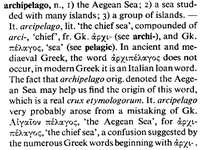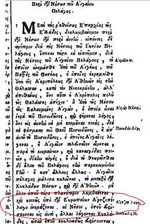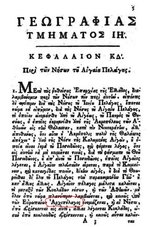Language change is driven by mistakes. If every generation of children perfectly learned what they heard spoken around them, then languages would be exact duplicates of themselves, never changing over the centuries. Clearly, this isn't what happens. As you can see from this list from Vocabulary.com, words have very often been formed by mishearings, inversion of sounds, dropping and adding of sounds, and other all-too-human errors.
10. ARCHIPELAGO
a group of many islands in a large body of water
The etymology of archipelago seems like it should be from Greek arkhi meaning "chief" and pelagos "sea," suggesting the importance of a sea with so many islands. The problem is that this form never occurs in ancient Greek, and the modern form is actually borrowed from Italian, with the intended meaning being "the Aegean Sea." If that's the case, then the archi- in archipelago is actually a corrupted version of Aigaion, which is how you say "Aegean" in Greek.
Συζήτηση που ξεκίνησε από εδώ:
http://lexilogia.gr/forum/showthrea...οφέρουμε-λάθος&p=231074&viewfull=1#post231074
10. ARCHIPELAGO
a group of many islands in a large body of water
The etymology of archipelago seems like it should be from Greek arkhi meaning "chief" and pelagos "sea," suggesting the importance of a sea with so many islands. The problem is that this form never occurs in ancient Greek, and the modern form is actually borrowed from Italian, with the intended meaning being "the Aegean Sea." If that's the case, then the archi- in archipelago is actually a corrupted version of Aigaion, which is how you say "Aegean" in Greek.
Συζήτηση που ξεκίνησε από εδώ:
http://lexilogia.gr/forum/showthrea...οφέρουμε-λάθος&p=231074&viewfull=1#post231074



